- Home
- Jon McGregor
If Nobody Speaks of Remarkable Things
If Nobody Speaks of Remarkable Things Read online
To Alice
Contents
Chapter 1
Chapter 2
Chapter 3
Chapter 4
Chapter 5
Chapter 6
Chapter 7
Chapter 8
Chapter 9
Chapter 10
Chapter 11
Chapter 12
Chapter 13
Chapter 14
Chapter 15
Chapter 16
Chapter 17
Chapter 18
Chapter 19
Chapter 20
Chapter 21
Chapter 22
Chapter 23
Chapter 24
Chapter 25
Chapter 26
Chapter 27
Chapter 28
Chapter 29
Chapter 30
Chapter 31
Acknowledgements
A Note on the Author
Also available by Jon McGregor
Chapter 1
If you listen, you can hear it.
The city, it sings.
If you stand quietly, at the foot of a garden, in the middle of a street, on the roof of a house.
It’s clearest at night, when the sound cuts more sharply across the surface of things, when the song reaches out to a place inside you.
It’s a wordless song, for the most, but it’s a song all the same, and nobody hearing it could doubt what it sings. And the song sings the loudest when you pick out each note.
The low soothing hum of air-conditioners, fanning out the heat and the smells of shops and cafes and offices across the city, winding up and winding down, long breaths layered upon each other, a lullaby hum for tired streets.
The rush of traffic still cutting across flyovers, even in the dark hours a constant crush of sound, tyres rolling across tarmac and engines rumbling, loose drains and manhole covers clack-clacking like cast-iron castanets.
Road-menders mending, choosing the hours of least interruption, rupturing the cold night air with drills and jack-hammers and pneumatic pumps, hard-sweating beneath the fizzing hiss of floodlights, shouting to each other like drummers in rock bands calling out rhythms, pasting new skin on the veins of the city.
Restless machines in workshops and factories with endless shifts, turning and pumping and steaming and sparking, pressing and rolling and weaving and printing, the hard crash and ring and clatter lifting out of echo-high buildings and sifting into the night, an unaudited product beside the paper and cloth and steel and bread, the packed and the bound and the made.
Lorries reversing, right round the arc of industrialparks, it seems every lorry in town is reversing, backing through gateways, easing up ramps, shrill-calling their presence while forklift trucks gas and prang around them, heaping and stacking and loading.
And all the alarms, calling for help, each district and quarter, each street and estate, each every way you turn has alarms going off, coming on, going off, coming on, a hammered ring like a lightning drum-roll, like a mesmeric bell-toll, the false and the real as loud as each other, crying their needs to the night like an understaffed orphanage, babies waawaa-ing in darkened wards.
Sung sirens, sliding through the streets, streaking blue light from distress to distress, the slow wail weaving urgency through the darkest of the dark hours, a lament lifted high, held above the rooftops and fading away, lifted high, flashing past, fading away.
And all these things sing constant, the machines and the sirens, the cars blurting hey and rumbling all headlong, the hoots and the shouts and the hums and the crackles, all come together and rouse like a choir, sinking and rising with the turn of the wind, the counter and solo, the harmony humming expecting more voices.
So listen.
Listen, and there is more to hear.
The rattle of a dustbin lid knocked to the floor.
The scrawl and scratch of two hackle-raised cats.
The sudden thundercrash of bottles emptied into crates.
The slam-slam of car doors, the changing of gears, the hobbled clip-clop of a slow walk home.
The rippled roll of shutters pulled down on late-night cafes, a crackled voice crying street names for taxis, a loud scream that lingers and cracks into laughter, a bang that might just be an old car backfiring, a callbox calling out for an answer, a treeful of birds tricked into morning, a whistle and a shout and a broken glass, a blare of soft music and a blam of hard beats, a barking and yelling and singing and crying and it all swells up all the rumbles and crashes and bangings and slams, all the noise and the rush and the non-stop wonder of the song of the city you can hear if you listen the song
and it stops
in some rare and sacred dead time, sandwiched between the late sleepers and the early risers, there is a miracle of silence.
Everything has stopped.
And silence drops down from out of the night, into this city, the briefest of silences, like a falter between heartbeats, like a darkness between blinks. Secretly, there is always this moment, an unexpected pause, a hesitation as one day is left behind and a new one begins.
A catch of breath as gasometer lungs begin slow exhalations.
A ring of tinnitus as thermostats interrupt air-conditioning fans.
These moments are there, always, but they are rarely noticed and they rarely last longer than a flicker of thought.
We are in that moment now, there is silence and the whole city is still.
The old tall-windowed mills, staggered across the skyline, they are silent, they are keeping their ghosts and their thoughts to themselves.
The smoked-glass offices, slung low to the ground, they are still, they are blankly reflecting the haze and shine of the night. Soon, they will resume their business, their coy whispers of ones and zeroes across networks of threaded glass, but now, for a moment, they are hushed. The buses in the depot, waiting for a new day, they are quiet, their metalwork easing and shrinking into place, settling and cooling after eighteen hours of heat and noise, eighteen hours of criss-crossing the city like wool on a loom.
And the clubs in the centre, they are empty, the dancefloors sticky and sore from a night’s pounding, the lights still turning and blinking, lost shoes and wallets and keys gathered in heaps.
And the night-fishers strung out along the canal, feeling the sing of their lines in the water, although they are within yards of each other they are saying nothing, watching luminous floats hang in the night like bottled fireflies, waiting for the dip and strike which will bring a centre to their time here, waiting for the quietness and calm they have come here to find.
Even the traffic scattered through these streets: the taxis and the cleaners, the shift-workers and the delivery drivers, even they are held still in this moment, trapped by traffic lights which synchronise red as the system cycles from old day to new, hundreds of feet resting on accelerators, hundreds of pairs of eyes hanging on the lights, all waiting for the amber, all waiting for the green.
The whole city has stopped.
And this is a pause worth savouring, because the world will soon be complicated again.
It’s the briefest of pauses, with not time enough to even turn full circle and look at all the lights this city throws out to the sky, and it’s a pause which is easily broken. A slamming door, a car alarm, a thin drift of music from half a mile away, and already the city is moving on, already tomorrow is here.
The music is coming from a curryhouse near the football ground, careering out of speakers placed outside to attract extra custom. The restaurant is almost empty, a bhindi masala in one corner, a special korma in the other, and the carpark is deserted except for a young couple stan
ding with their arms around each other’s waists. They’ve not been a couple long, a few days perhaps, or a week, and they are both still excited and nervous with desire and possibility. They’ve come here to dance, drawn sideways from their route home by the music and by bravado, and now they are hesitating, unsure of how to begin, unfamiliar with the steps, embarrassed.
But they do begin, and as the first smudges of light seep into the sky from the east, from the far side of the city and in towards these streets, they hold their heads high and their backs straight and step together in time to the slide and wheel of the music. They dance with a style more suited to the ballroom than to the bollywood movies the music comes from, but they dance all the same, hips swinging, waists touching, eyes fixed on eyes. The waiters have come across to the window, they are laughing, they are calling uncle uncle to the man in the kitchen who is finally beginning to clean up after a long night. They dance, and he steps out of the door to watch, wiping his hands on his apron, licking the weary tips of his fingers, pulling at his long beard. They dance, and he smiles and nods and thinks of his wife sleeping at home, and thinks of when they were young and might still have done something like this.
Elsewhere, across the city, the day is beginning with a rush and a shout, the fast whine of office hoovers, the locked slam of lorry doors, the hurried clocking on of the early shifts.
But here, as the dawn sneaks up on the last day of summer, and as a man with tired hands watches a young couple dance in the carpark of his restaurant, there are only these: sparkling eyes, smudged lipstick, fading starlight, the crunching of feet on gravel, laughter, and a slow walk home.
He was the first to move, the boy from number eighteen.
He was up and across the street before anyone had blinked, before anyone had made a sound.
It was as if he knew what he had to do, as if he’d been waiting for the opportunity.
He moved off the doorstep like a loaded sprinter, and by the time I turned to see who it was he was there.
He was there and then it was over, and it was so sudden that I felt as though a camera flash had exploded in my face.
Everything went white, ghostly, like old news footage, faded and stained.
I couldn’t understand what was happening, I couldn’t believe what was happening.
I sat there, in the warm afternoon of the last day of summer, and I couldn’t work out what I was seeing.
I watched him moving across the street, the boy from number eighteen, and I tried to understand.
I don’t remember seeing it, not the moment itself, I remember strange details, peripheral images, small things that happened away from the blinded centre.
I remember the girl next to me dropping her can of beer and swaying backwards, as though from a shockwave.
I can picture the can hitting the ground, the weight of it crushing into the grass, the way it tipped to one side but stayed upright, like a half-fallen telegraph pole in a storm.
I can see a slow-motion image of the beer, frothing from the top of the can, a coil of it rising up like smoke, hanging in the light a moment before spreading flat into the grass and spraying across my lap.
I don’t know where that comes from.
I don’t know how I could possibly have seen these details.
The fizz of the beer popping into sparkles of air.
Blades of grass straightening themselves as the liquid soaks into the soil, the damp patch on my skirt shrinking and fading and drying in the sun.
The brightness of the light.
There was a woman leaning out of a high window, shaking a blanket.
There were some boys over the road having a barbecue, pushing a knife into the meat to see if it was cooked.
There was a man with a long beard, up a ladder at number twenty-five, painting his windowframes, he’d been there all day and he’d almost finished.
Each frame was gleaming wetly in the sun, a beautiful pale blue like the first faint colour of dawn and it had been nice to watch the slow thoroughness of his work.
There was a boy in the next-door garden, cleaning his trainers with a nailbrush and a bowl of soapy water.
I can see all these moments as though they were cast in stone, small moments captured and enlarged by the context, like figures in a Pompeii exhibition.
The woman with the blanket, interrupted mid-swing, her attention snatched away, the blanket losing momentum and flapping gently against the wall.
Her arms still stretched out, her lips still pursed against the billowing dust.
The blanket hanging down towards the ground, like a semaphore.
Somebody said oh my God.
A boy on a red tricycle rode into a tree.
His feet slipped off the pedals and got caught under the wheels, tugging him from his seat and down towards the ground.
I can see him, falling sideways, his leg about to scrape the concrete, his head about to hit the tree, his tricycle tipping onto two wheels and his attention clamped into the road.
His head kept turning as he fell, and when he hit the ground, he could only lie there, watching, like everyone else.
He can barely have been three years old, I wanted to run to him and cover his eyes but I couldn’t move so he kept on looking.
A man who’d been washing his car lifted both his hands to the top of his head, squeezing them into fists.
He was still holding a sponge, water crushing out of it and down his back but he didn’t move.
Somebody said oh shit oh shit oh shit.
But mostly there was this moment of absolute silence. Absolute stillness.
It can’t actually have been like that of course, there must still have been music playing, and traffic passing along the main road, but that’s the way I remember it, with this single weighted pause, the whole street frozen in a tableau of gaping mouths.
And the boy from number eighteen, moving through the locked moment like a blessing.
It seemed, or at least it seems now, that everything else was motionless.
The beercan caught between the hand and the ground.
The blanket not quite touching the wall.
The boy with the tricycle a flinch away from the tree.
A gasp in my throat, held back, like the air in the pinched neck of a balloon.
And it all seemed wrong somehow, unreal, unconnected to the sort of day it had been.
An uneventful day, slow and warm and quiet, people talking on their front steps, children playing, music, a barbecue.
I’d been woken when it first got light by the slamming of taxi doors, people I knew at number seventeen coming back from a long night out and trailing slowly down the street.
I hadn’t been able to get back to sleep, I’d stayed in bed and watched the sun brightening into the room, listened to the kids running outside, the familiar rattle of the boy’s tricycle.
Later, I’d got up and had breakfast and tried to start packing, I’d sat on the front step and drank tea and read magazines.
I’d gone to the shop and talked briefly to the boy at number eighteen, he was awkward and shy and it didn’t make sense that he would be the one to move so instantly across the street.
It rained, towards the end of the afternoon, suddenly and heavily, but that was all, there was nothing else unusual or unexpected about the day.
And somehow it seems wrong that there wasn’t a buildup, a feeling in the air, a premonition or a warning or a clue.
I wonder if there was, actually, if there was something I missed because I wasn’t paying attention.
The silence didn’t last long, people started rushing out into the street, shouting, flinging open windows and doors.
A woman from down the road ran out towards them and stopped halfway, turning back, shaking her hands in front of her face.
The man up the ladder made a call on his mobile before climbing down and leaving the last frame half-painted.
There were people I didn’t even recognise coming out of the
ir houses to join the others.
But me and the other girl, Sarah, we just sat there, staring, holding our mouths open.
If we’d been closer, or younger, we might have held hands, tightly, but we didn’t.
I think she picked up her beer and drank a little more, and I think I drank as well.
I can’t remember, all I can remember is staring at the curtain of legs in the street, trying to see through.
Trying not to see through.
After a few minutes, the noise in the street seemed to quieten again.
The knot of people in the street loosened, turned aside.
People were looking to the main road, looking at their watches, waiting.
I remember noticing that there was still music coming out of half a dozen windows along the street, and then noticing that the songs were being silenced, one by one, like the lights going out at the end of The Waltons.
I remember a smell of burning, and seeing that the boys opposite had left their meat on the barbecue.
I could see the smoke starting to twist upwards.
I could see faces at windows.
I could see people glancing up, looking at the one door which was still closed.
Waiting for it to open, hoping that it might not.
I don’t understand why it seems so fresh in my mind, even now, three years later and a few hundred miles away.
I think about it, and I can’t even remember people’s names.
I just remember sitting there, those moments of waiting, murmurous and tense.
People striding to the end of the street, looking up and down the main road, stretching to see round the corner.
Turning back to the others and raising their hands.
The old man from number twenty-five, the brush in his hand, dribbling a trail of pale blue paint, walking towards the closed door.
Rubbing his bearded cheeks with the palm of his hand.
Knocking.
The distant careen of a siren, the man knocking at the door.
Chapter 2
A taxi drifts into the end of the street, its engine clicketing loudly as the doors open and half a dozen young people spill brightly out onto the pavement.

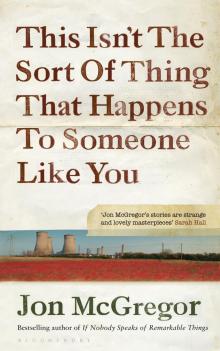 This Isn't the Sort of Thing That Happens to Someone Like You
This Isn't the Sort of Thing That Happens to Someone Like You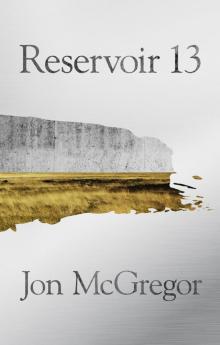 Reservoir 13
Reservoir 13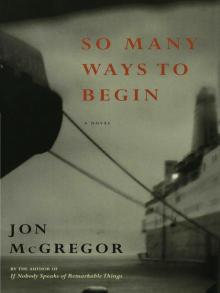 So Many Ways to Begin
So Many Ways to Begin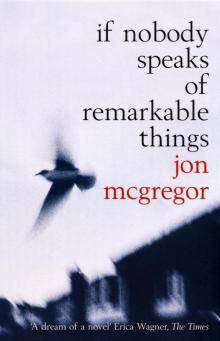 If Nobody Speaks of Remarkable Things
If Nobody Speaks of Remarkable Things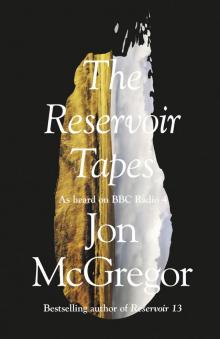 The Reservoir Tapes
The Reservoir Tapes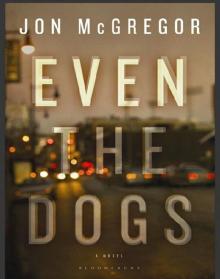 Even the Dogs: A Novel
Even the Dogs: A Novel